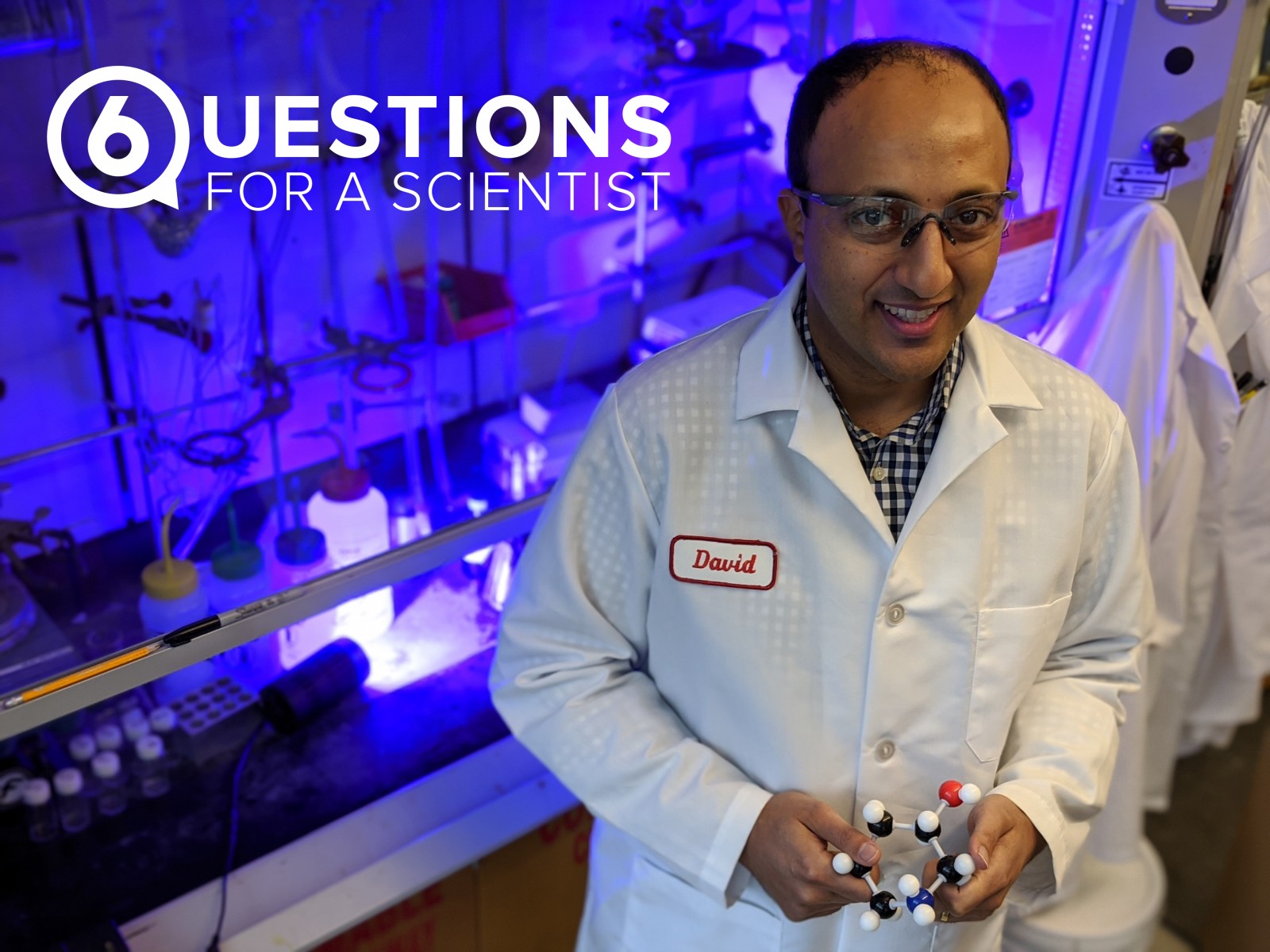“This is why we do science: to further the knowledge of humanity”
Six questions for a scientist with radical chemist David Nagib
You call yourself, and your students “radical chemists.” What’s the story with that phrase?
I do it for two reasons. One is for the pun. The word “radical” has a popular meaning that is kind of similar to the chemistry meaning — if something is radical, it is a renegade, it’s different, it marches to a different beat. And we like to think of ourselves as radical scientists! But also, classic chemistry is mostly concerned with two-electron systems, and how to make molecules and things by pairing two electrons together. All of classic chemistry is like a middle school dance — everyone, every electron, wants to pair up. And so imagine that there’s a bunch of electron pairs, and they’re happily dancing the waltz. And then you have this lone student who’s walking around with lots of energy, who isn’t paired up with another student, who’s kind of bouncing around alone. That’s a free radical — the odd one. And so the catalysts we develop in our lab are our attempts to harness that energy, to teach that student to, say, break dance so he can dance on his head. He’s still dancing, but a fundamentally different dance that wasn’t possible in the classic, paired, waltz. That’s radical chemistry — we want to use that energy to do fundamentally different things.
How and why did you become a scientist?
I’m the oldest of four, and I’m the only scientist, so this is something I think about a lot. I loved LEGOs as a kid, and my son is 3 now, and we play LEGOs a lot at home. My grandfather was an architect, and I think I just always figured I would build things. And then I got to college and I got to study organic chemistry, and I saw this 3D, spatial-reasoning LEGO-type aspect of it. I knew that building was my love, but I also loved science – I took every single science class I could: biology, chemistry, physics, calculus. But there was something about organic chemistry, and the way it combined the science and the 3D spatial aspects, that I loved.
What’s your favorite moment as a scientist?
When you do an experiment, it starts with a hypothesis, and you test it out, and there’s a moment where you go to check what happens, and you go downstairs — in our building we have these million-dollar magnets that let us check what we’re doing; they’re called nuclear magnetic resonance instruments: like an MRI at the hospital — and like 99 times out of 100, it doesn’t work. And that one moment that it does work is just the best feeling in the world. It’s like, this is why we do science: to further the knowledge of humanity. There’s this idea and feeling that no one else in the world has seen or done this thing that you’ve done.
What is the most fun thing in your lab?
The people, no question. We believe very much in “work hard, play hard,” so, while we’re working a lot, there are also some funny pranks and shenanigans. They’re always harmless, but they make it fun. I genuinely love the things that are at the core of this job, this profession, this life. The students in my research group get me so excited. Sometimes, I might be down after a long or boring committee meeting, but then I come back to the lab and my students come running to me with an exciting result from some experiment they got, and it’s so satisfying.
What big scientific question do you hope to see answered in your lifetime?
Twenty years ago, if you wanted to call someone who was far away, you had to go get a calling card and get to a phone, and call them, and now we all carry little computers in our pockets that allow us to video chat from thousands and thousands of miles away. Communication has fundamentally changed, and my students take it for granted — they don’t know any other way. I hope that we can make that same thing happen for radical chemistry. Our organic chemistry textbooks are almost completely devoted to studying what happens in the classic two-electron world, but we don’t know what’s fully possible if we can figure out how to harness all the energy of that free radical “break-dancer” electron. I hope we get that question answered so that in 20 years, students just take for granted the knowledge that free radicals can do all these different things.
That and transportation. I’d love to see us figure out how to move ourselves around the world faster.
What could change in society to help you and your team do better science?
I just came back from China, where it seems they as a society have decided to support scientific research at just a polar opposite scale. Put any three scientists at a table over dinner in the U.S., and we’ll complain about how difficult it is to get research funding, but when I travel internationally, I see unlimited resources going into new, state-of-the-art laboratories and research centers. I think about the moon shot, how we went to the moon in the 60s and we just did that because we decided we were going to do it. It makes me wonder about how many more great things chemistry could provide to humanity if we prioritized modern chemical research in the same way. It could lead to the next Teflon, Tesla, Lipitor, or something not yet even imaginable.


